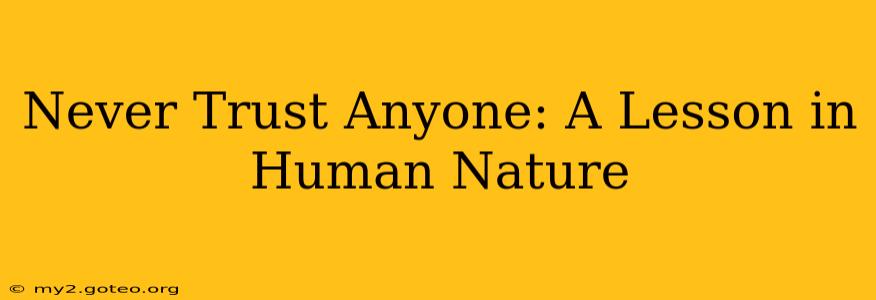The adage "never trust anyone" might sound cynical, even paranoid. However, it highlights a crucial aspect of human nature: the capacity for deception, self-interest, and betrayal. While complete distrust is impractical and unhealthy, understanding the potential for dishonesty is a vital life skill. This isn't about becoming a hardened cynic, but about cultivating a healthy skepticism and making informed decisions about who to trust and when. This exploration delves into the complexities of trust, deception, and navigating the human landscape.
Why is it Difficult to Trust People?
Trust is a fundamental element of human interaction, forming the bedrock of relationships, both personal and professional. Yet, the ability to trust is often challenged by various factors. One primary reason is the inherent self-interest that guides much of human behavior. People act in ways they perceive to benefit themselves, even if it means compromising the interests of others. This isn't necessarily malicious; it's a fundamental aspect of survival and competition.
Furthermore, human fallibility plays a significant role. We make mistakes, we misjudge situations, and we may unintentionally mislead others, even if we don't intend to deceive. Our own biases and limited perspectives can also distort our perception of others' intentions, leading to misinterpretations and damaged trust.
What are the Signs Someone Might Be Deceiving You?
Recognizing deceptive behavior is crucial for protecting yourself. However, it's important to remember that these signs are not definitive proof of deception, but rather red flags that warrant further investigation. Some common signs include:
- Inconsistencies in their story: Do their accounts change over time? Are there contradictions between what they say and their actions?
- Avoidance of direct answers: Do they evade your questions or give vague responses?
- Excessive detail or overly precise recollection: This can sometimes be a tactic to appear more credible, even if the details are fabricated.
- Body language cues: While not always reliable, things like nervous fidgeting, avoiding eye contact, or unusually defensive postures can be indicators of deception. However, these must be interpreted within the context of the situation and the individual's personality.
- A lack of emotional congruence: Do their emotions seem genuine and consistent with their words? Discrepancies here can be a red flag.
How Can I Protect Myself from Deception?
Complete distrust is unsustainable, but informed caution is essential. Strategies to minimize vulnerability to deception include:
- Verify information: Don't rely solely on what someone tells you. Seek corroboration from other sources whenever possible.
- Observe behavior over time: Actions speak louder than words. Observe someone's behavior patterns and look for consistency between their words and their actions.
- Trust your gut feeling: While not foolproof, your intuition can sometimes pick up on subtle cues that your conscious mind might miss.
- Set boundaries: Don't overshare personal information until you've established a level of trust.
- Diversify your relationships: Don't rely on a single source of information or support. Cultivate a wide network of connections.
Is It Better to Trust No One or Trust Everyone?
Neither extreme is advisable. A blanket policy of distrusting everyone isolates you and prevents you from forming meaningful relationships. On the other hand, uncritical trust makes you vulnerable to exploitation. The key is to cultivate a discerning approach to trust, carefully evaluating each situation and individual on their merits.
How Do I Know Who to Trust?
Building trust is a gradual process that requires time, observation, and consistent positive interactions. It involves assessing someone's character, integrity, and reliability. Look for evidence of honesty, consistency, and empathy. Trust is earned, not given freely.
Can You Ever Truly Trust Anyone?
The question of whether anyone can ever be truly trusted is subjective. While complete, unconditional trust might be rare, building trust in select individuals is essential for a fulfilling life. It's a matter of carefully selecting who you entrust with your vulnerabilities and navigating the inherent risks of human interaction with a balance of optimism and realistic caution. The key is to cultivate discernment and protect yourself from those who would exploit your trust.

